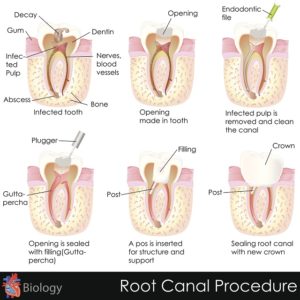
Root Canal Procedure
Catonsville Dental Care takes care of root canal treatment for residents living in Baltimore County. Come in and discover why we’re one of the best dentist offices in Baltimore County. We want to make you feel confident again and be the reason you flaunt your smile. Today we’re going to offer you a guide on root canal treatments. If you believe that your enamel is severely infected, then keep reading.
Debunking the Myth
The purpose behind a root canal is not to put you in pain. The goal is to improve your oral health and overall health. If your tooth is infected, then the point of a root canal is to save that tooth. If you have anxiety about complex cosmetic dental procedures, then we specialize in gentle dentistry and sedation dentistry as well. We have the tools and communication skills to make your experience comfortable and pain-free.
When You Need to Seek Treatment
When there is a deep infection inside your tooth, you most likely need a root canal. If there is an injury or untreated cavity, the pulp inside the tooth may become infected. Without treatment, tooth loss is possible.
How Does the Procedure Work?
The procedure takes typically four steps between two visits to the dentist. Here are those four steps:
1) A dentist uses a needle to apply local anesthesia to the tooth. Once the tooth is numb, an endodontist (a person who specializes in diseases and injuries involving the tooth’s pulp) places a dental dam over the tooth to separate it. This step is necessary to keep it clean and dry during the procedure.
2) The dentist uses a small drill to access the inside of the tooth. Then, a dentist uses a small file to extract the damaged and diseased pulp. The small files also help to shape the inner chamber of the tooth and root and water clears away the remaining pulp. An antimicrobial solution is necessary to kill additional bacteria and keep it from coming back.
3) The dentist will fill the chamber once it is clean and dry. Gutta-percha (a rubber-like material) is what top dentists often use. While you wait for a permanent crown, a temporary filling takes its place in the meantime.
4) The endodontist will then place a permanent crown over your tooth after a few weeks. Depending on how healthy your natural tooth is, an endodontist may need to install a small post to make your tooth as secure as possible.
Oral Care from Catonsville Dental Care in Baltimore County
Whether you want to whiten your teeth, straighten your teeth or have a wisdom tooth extracted Catonsville Dental Care offers a wide variety of services when it comes to oral health. We have the experience and understanding to diagnose and treat any problem you have as quickly and painlessly as possible. With four dentists available at our office and commitment to comfort, safety, and relaxation you can’t find a better provider for your health. We look forward to helping you keep your smile perfect all year long and talking with you about your needs. To schedule an appointment or consultation, visit us online or give us a call at 410-747-1115. For more tips and tricks follow us on Facebook, Flickr,Twitter,andYouTube.
